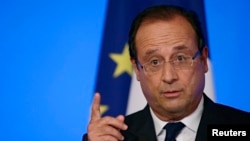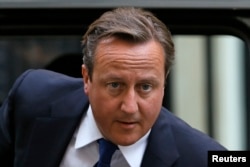LONDON —
France is ready to “punish” those who carried out an alleged chemical weapons attack in Syria last week, the French president said Tuesday. But European nations are divided in their response to an escalating crisis in Syria.
Speaking at a conference with French ambassadors on Tuesday, Francois Hollande said France is ready to punish those who took the heinous decision to gas innocents last week.
His comments came as Britain’s Prime Minister David Cameron recalled parliament to debate Britain’s response. MPs will meet Thursday and are set to take a vote.
Cameron told reporters Tuesday that while no decision had yet been made about Britain's possible involvement in military action against the government of Syrian President Bashar al-Assad, any such military action should be specific and not lead to a wider Middle Eastern war.
"It's about chemical weapons," Cameron said. "Their use is wrong and the world should not stand idly by."
Since the beginning of the year, France and Britain have both been at the forefront of bids to lift a European arms embargo on Syrian rebels.
Former European Union diplomat Marc Pierini says, the two nations, as in recent overseas campaigns, would spearhead any European military action in Syria.
“If you take a very different case, which is the Mali operation in January, you can see that only a very few countries can bring significant contributions," he said. "So we are basically talking in Europe about Britain and France.”
But many British politicians have voiced skepticism over Britain taking military action. And elsewhere in Europe, politicians are more hesitant to wage a military campaign in Syria.
On Tuesday, Italy’s foreign minister Emma Bonino said italy would only support a military strike against Syria if it was authorized by the United Nations Security Council.
Germany, which has Europe’s largest economy, has said there should be “consequences” if the alleged chemical attack is proven. But Pierini says it is unlikely to get involved in any military campaign, especially in the run-up to a general election next month.
“Germany rarely intervenes outside its borders. ISAF in Afghanistan was the exception, but if you look at Libya or Mali, they did not intervene,” he said.
Last week, an alleged chemical weapons attack took place in a suburb of Damascus. According to the aid group Doctors Without Borders. more than 350 people were killed.
The Syrian authorities have denied responsibility for the attack, but the U.S., Britain, and France say they have little doubt that Syrian government forces carried it out.
But the three countries are unlikely to get support for military intervention at the U.N. Security Council, where Syria’s allies have repeatedly blocked moves to sanction the Syrian government.
Paul Schulte is a weapons expert at King’s College London. He says there are historic precedents for international action without Security Council backing, including NATO’s 1999 intervention in Kosovo, which was made on humanitarian grounds.
He says having the support of NATO gave that intervention legitimacy.
“You have the moral legitimacy of an entire alliance, which was an accepted leading regional security organization for Europe, saying we are going to do this. That would be politically desirable - if we could reach a similar dissemination in the case of NATO. I’m not sure we can,” he said.
He says NATO’s response in Syria is unlikely to be as united. Some European countries, he says, feels the Syrian conflict is not their responsibility and will not want to take action without unanimous Security Council’s support.
“It’s going to be messy, and the term which is coming up is the 'coalition of the few', which would presumably be the U.S., the UK, France, maybe Turkey and maybe other allies who are not in NATO but are sympathetic, like Jordan, Saudi, and the Gulf States,” said Schulte.
Syria’s main ally, Russia, said Monday that military intervention in Syria without the approval of the United Nations would be a “grave violation of international law.”
Speaking at a conference with French ambassadors on Tuesday, Francois Hollande said France is ready to punish those who took the heinous decision to gas innocents last week.
His comments came as Britain’s Prime Minister David Cameron recalled parliament to debate Britain’s response. MPs will meet Thursday and are set to take a vote.
Cameron told reporters Tuesday that while no decision had yet been made about Britain's possible involvement in military action against the government of Syrian President Bashar al-Assad, any such military action should be specific and not lead to a wider Middle Eastern war.
"It's about chemical weapons," Cameron said. "Their use is wrong and the world should not stand idly by."
Since the beginning of the year, France and Britain have both been at the forefront of bids to lift a European arms embargo on Syrian rebels.
Former European Union diplomat Marc Pierini says, the two nations, as in recent overseas campaigns, would spearhead any European military action in Syria.
“If you take a very different case, which is the Mali operation in January, you can see that only a very few countries can bring significant contributions," he said. "So we are basically talking in Europe about Britain and France.”
But many British politicians have voiced skepticism over Britain taking military action. And elsewhere in Europe, politicians are more hesitant to wage a military campaign in Syria.
On Tuesday, Italy’s foreign minister Emma Bonino said italy would only support a military strike against Syria if it was authorized by the United Nations Security Council.
Germany, which has Europe’s largest economy, has said there should be “consequences” if the alleged chemical attack is proven. But Pierini says it is unlikely to get involved in any military campaign, especially in the run-up to a general election next month.
“Germany rarely intervenes outside its borders. ISAF in Afghanistan was the exception, but if you look at Libya or Mali, they did not intervene,” he said.
Last week, an alleged chemical weapons attack took place in a suburb of Damascus. According to the aid group Doctors Without Borders. more than 350 people were killed.
The Syrian authorities have denied responsibility for the attack, but the U.S., Britain, and France say they have little doubt that Syrian government forces carried it out.
But the three countries are unlikely to get support for military intervention at the U.N. Security Council, where Syria’s allies have repeatedly blocked moves to sanction the Syrian government.
Paul Schulte is a weapons expert at King’s College London. He says there are historic precedents for international action without Security Council backing, including NATO’s 1999 intervention in Kosovo, which was made on humanitarian grounds.
He says having the support of NATO gave that intervention legitimacy.
“You have the moral legitimacy of an entire alliance, which was an accepted leading regional security organization for Europe, saying we are going to do this. That would be politically desirable - if we could reach a similar dissemination in the case of NATO. I’m not sure we can,” he said.
He says NATO’s response in Syria is unlikely to be as united. Some European countries, he says, feels the Syrian conflict is not their responsibility and will not want to take action without unanimous Security Council’s support.
“It’s going to be messy, and the term which is coming up is the 'coalition of the few', which would presumably be the U.S., the UK, France, maybe Turkey and maybe other allies who are not in NATO but are sympathetic, like Jordan, Saudi, and the Gulf States,” said Schulte.
Syria’s main ally, Russia, said Monday that military intervention in Syria without the approval of the United Nations would be a “grave violation of international law.”











